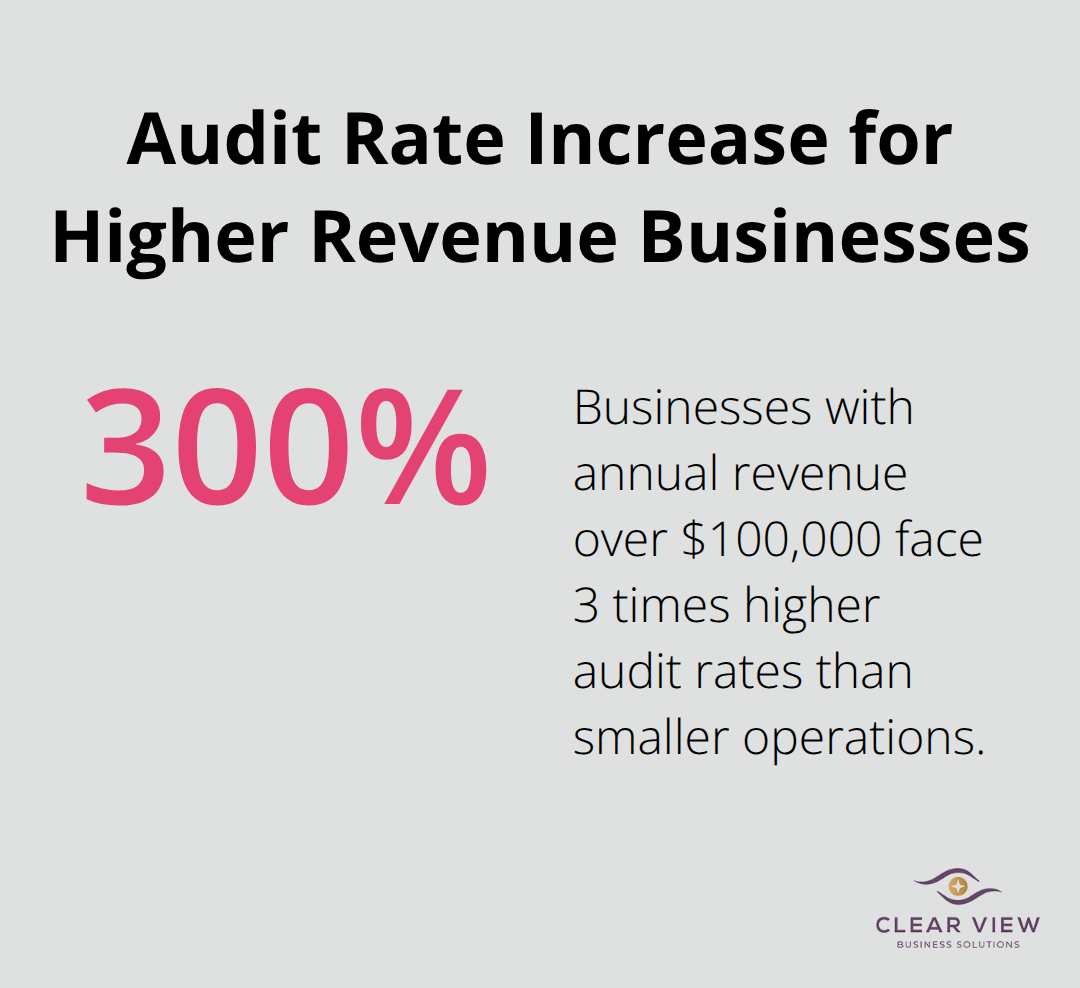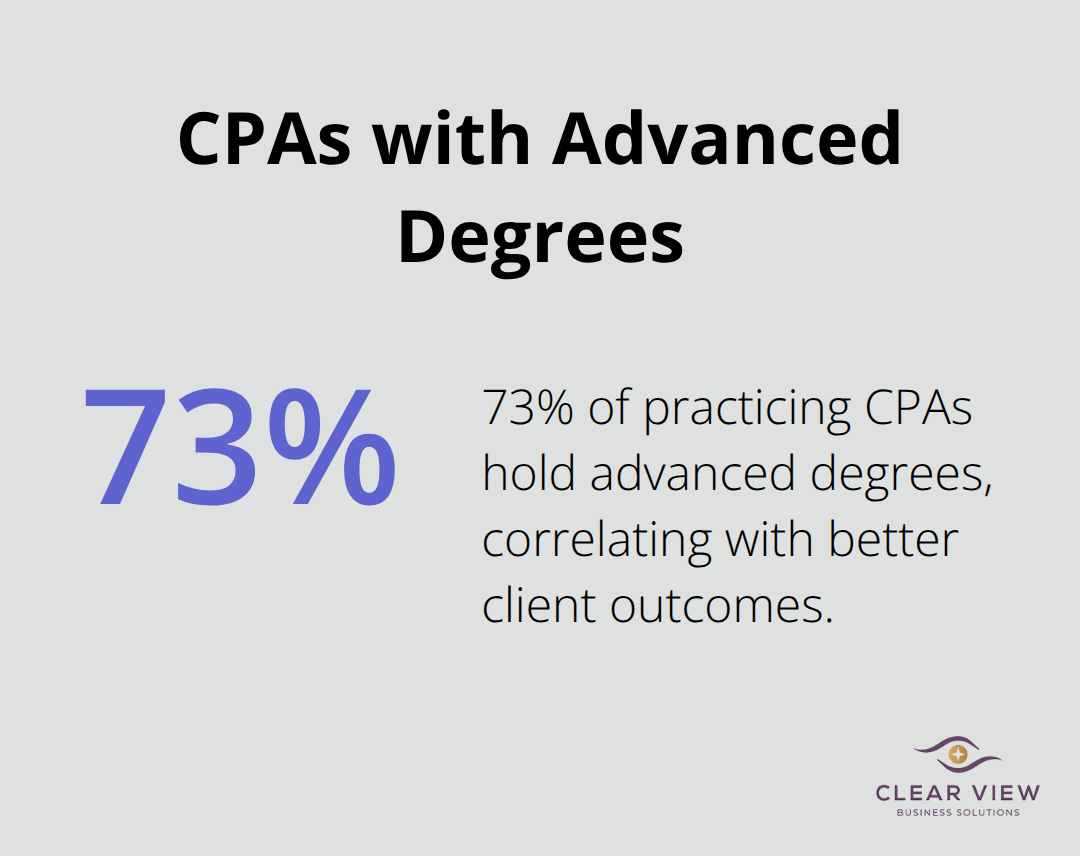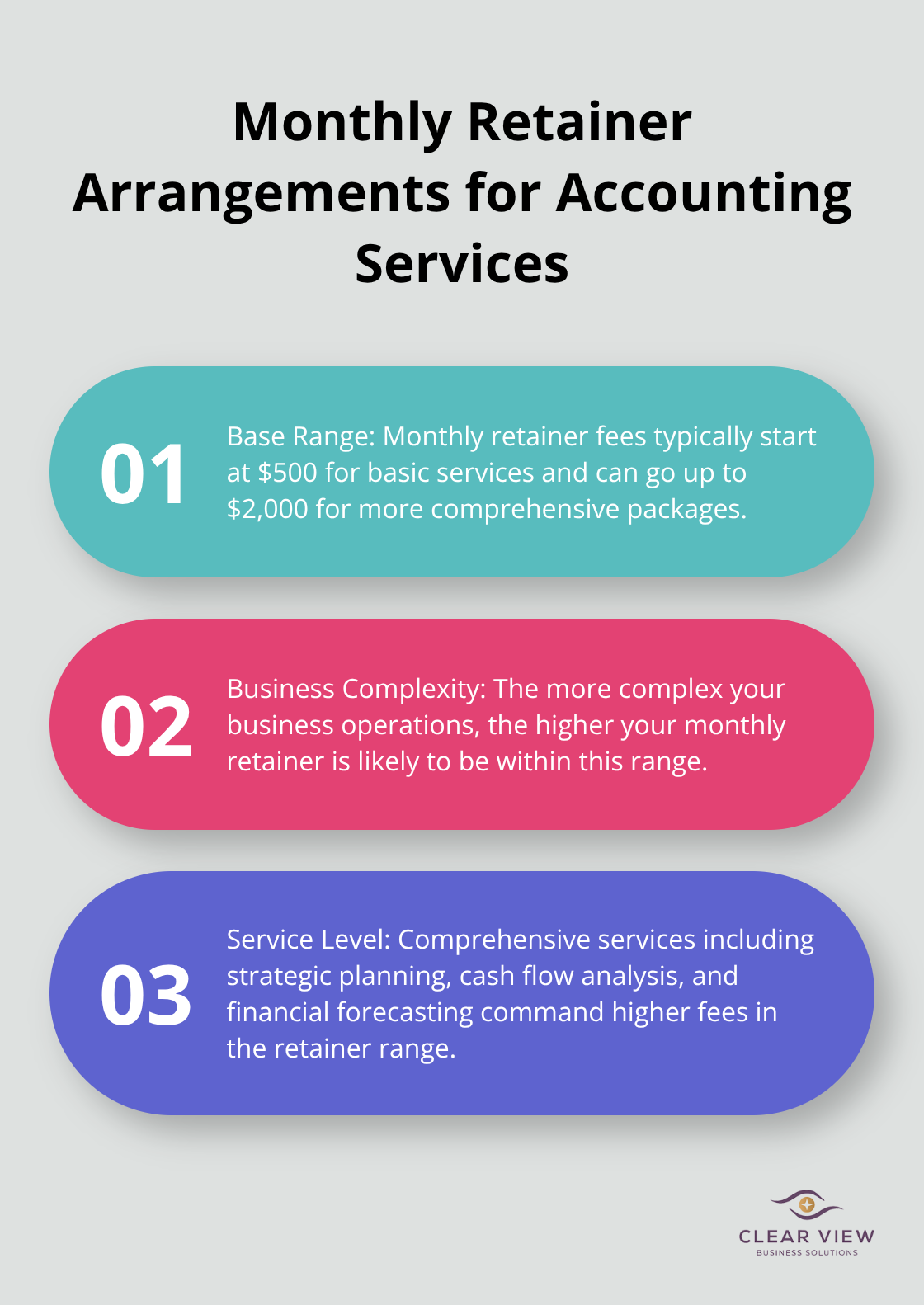

Finding the right financial professional can make or break your business’s success. Many business owners struggle with knowing exactly what to look for when hiring.
We at Clear View Business Solutions see this challenge daily. Learning how to find a good accountant requires understanding specific qualifications, asking the right questions, and recognizing when your business actually needs professional help.
Most business owners wait too long to hire professional help, and this delay costs them money. Cash flow issues can result from a lack of funding, poor budgeting, or inventory management issues, among other things, yet many of these failures could be prevented with proper financial management and early professional intervention.
Your business crosses a critical threshold when monthly revenue consistently exceeds $10,000. At this point, financial complexity multiplies rapidly. Tax obligations shift from simple personal returns to quarterly estimated payments, sales tax compliance becomes mandatory in most states, and cash flow management requires sophisticated forecasts.
The IRS data shows that businesses with annual revenue over $100,000 face audit rates three times higher than smaller operations. Professional accountants help navigate these increased scrutiny levels while they identify deductions that typically save clients 15-20% on their tax liability. When your revenue growth outpaces your ability to track expenses, manage invoices, and plan for tax obligations, professional help becomes essential rather than optional.

Complex tax situations demand professional expertise. Multi-state operations, inventory management, employee payroll, and equipment depreciation create layers of compliance requirements that most business owners cannot handle effectively. Business tax compliance costs can be substantial, with companies spending millions on income tax compliance annually.
Professional accountants stay current with tax law changes (which occur approximately 4,000 times per year according to the National Taxpayers Union) and apply these updates to your specific situation. They also handle quarterly filings, estimated payments, and year-end planning that prevents costly penalties and missed opportunities.
Financial tasks should consume no more than 5% of your weekly schedule as a business owner. When bookkeeping, tax preparation, and financial reports take more than four hours per week, you operate inefficiently. Harvard Business Review research indicates that small business owners who delegate financial tasks to professionals increase their revenue growth rate by 23% compared to those who handle finances internally.
The hourly cost of professional services typically ranges from $150-300, while most business owners generate significantly higher hourly value through core business activities. By hiring a CPA to handle your tax planning and bookkeeping, you can focus on what you do best – running your business. Professional accountants complete monthly bookkeeping in 2-3 hours compared to the 8-12 hours most business owners require for the same work.
These clear indicators point to the need for professional help, but success depends on finding an accountant with the right qualifications and expertise for your specific business needs.
Professional certifications separate competent accountants from those who lack proper training. The CPA designation requires 150 credit hours of education, passes a rigorous four-part exam with a minimum score of 75, and completes two years of supervised experience. According to the National Association of State Boards of Accountancy, only 25% of accounting graduates ever obtain CPA certification. This certification means your accountant maintains continuing education requirements of 40 hours annually and adheres to strict ethical standards that state boards enforce.
State licensing boards verify CPA credentials and track disciplinary actions. You should check your state’s Board of Accountancy website before hiring any professional. Licensed CPAs carry professional liability insurance and follow standardized audit procedures that protect your business interests.
Enrolled Agents (EAs) represent another valuable credential for tax-focused work. The IRS grants EA status after candidates pass a comprehensive three-part exam covering individual and business taxation. EAs specialize in tax preparation and IRS representation, though they lack the broader financial expertise that CPAs provide.
Master’s degree holders in accounting demonstrate deeper knowledge of complex tax codes and financial regulations. The American Institute of CPAs reports that 73% of practicing CPAs hold advanced degrees, which correlates with better client outcomes and fewer compliance errors.

Industry specialization matters more than general experience. An accountant with five years in retail understands inventory valuation methods, sales tax complexities, and seasonal cash flow patterns that generic practitioners miss. Manufacturing businesses need accountants familiar with cost accounting, depreciation schedules, and Section 199A deductions (which can save pass-through entities up to 20% on qualified business income).
Restaurant operations require expertise in tip reporting, labor cost analysis, and local health department compliance that intersects with tax obligations.
Modern accounting demands cloud-based software proficiency. QuickBooks Online dominates with 80% market share among small businesses, which makes this expertise non-negotiable. Your accountant should demonstrate advanced features like automated bank feeds, multi-location reporting, and integration with payment processors.
Excel mastery remains essential for complex analysis and custom reporting. Accountants who use outdated desktop software create inefficiencies and limit real-time collaboration. The best practitioners use document management systems, secure client portals, and digital signature platforms that streamline communication and reduce processing time by 60% compared to paper-based workflows.
These qualifications provide the foundation, but you need to ask specific questions to evaluate whether an accountant fits your business needs and communication style.
The interview process separates qualified professionals from those who cannot deliver results. Ask direct questions about service scope first. Most accountants limit themselves to tax preparation, but your business needs strategic planning, cash flow analysis, and financial forecasting. Request specific examples of how they helped similar businesses reduce costs or improve profitability. An accountant who mentions saving clients an average of $8,000 annually through tax planning demonstrates measurable value. Those who provide vague responses about general tax advice lack the expertise your business requires.
Professional accountants should offer monthly bookkeeping, quarterly reviews, and year-round tax planning. Ask about their experience with businesses similar to yours in payroll processing, sales tax compliance, and financial statement preparation. The best practitioners provide controller-level services that include budget creation, variance analysis, and growth projections. They should explain how they track key performance indicators specific to your industry and demonstrate familiarity with business credit applications, loan documentation, and investor reporting requirements.
Establish communication expectations immediately. Professional accountants respond to emails within 24 hours and phone calls within four hours during business days (excluding weekends and holidays). They should offer quarterly business reviews, monthly financial summaries, and proactive tax planning sessions. Ask about their client portal capabilities and document sharing systems. When evaluating potential providers, ask tough questions about their experience, technology, and communication practices. Accountants who rely solely on email attachments operate inefficiently and create security risks for sensitive financial data.
Transparent pricing separates professional practices from those that surprise clients with hidden costs. Request detailed fee schedules for tax preparation, bookkeeping, and advisory services. Monthly retainer arrangements typically range from $500-2,000 depending on business complexity and service level. Hourly rates for project work should fall between $150-300 based on geographic location and expertise level (with major metropolitan areas commanding higher rates). Avoid accountants who quote unrealistically low fees or refuse to provide written estimates, as both indicate potential service problems or unexpected charges later.

The right accountant transforms your business operations through professional certifications, industry expertise, and modern technology skills. CPA credentials, specialized knowledge in your sector, and proficient software abilities create the foundation for exceptional service. Clear communication standards, transparent fees, and comprehensive offerings beyond basic tax preparation separate outstanding practitioners from mediocre ones.
Your chosen financial partner directly affects business growth potential and compliance success. Professional accountants who understand your industry save clients 15-20% on tax liability while they prevent costly penalties through proactive planning. They free your time to focus on core business activities that generate higher returns than internal financial management (which typically consumes 8-12 hours weekly for most business owners).
Start your search when you define specific needs and request referrals from trusted contacts. Interview multiple candidates, verify credentials through state boards, and check client references before you decide. When you master how to find a good accountant, you position your business for sustained financial success and regulatory compliance. We at Clear View Business Solutions provide comprehensive accounting and advisory services for businesses that need expert financial guidance and support.
At Clear View Business Solutions, we know you want your business to prosper without having to worry about whether you are paying more in taxes than you should or whether your business is set up correctly. The problem is it's hard to find a trusted advisor who can translate financial jargon to layman's terms and who can actually help you plan for better results.
We believe it doesn't have to be this way! No business owner should settle for working with a CPA firm that falls short of understanding what you want to achieve and how to help you get there.

Northwest Location:
7530 N. La Cholla Blvd., Tucson, AZ 85741
Central Location:
2929 N Campbell Avenue, Tucson, AZ 85719
© 2025 Clear View Business Solutions. All Rights Reserved.
At Clear View Business Solutions, we know you want your business to prosper without having to worry about whether you are paying more in taxes than you should or whether your business is set up correctly. The problem is it's hard to find a trusted advisor who can translate financial jargon to layman's terms and who can actually help you plan for better results.
We believe it doesn't have to be this way! No business owner should settle for working with a CPA firm that falls short of understanding what you want to achieve and how to help you get there. With over 20 years of experience serving hundreds of business owners like you, our team of experts combines financial expertise and proactive communication with our drive to help each client achieve results and have fun along the way.
Here's how we do it:
Discover: We start with a consultation to understand your specific goals, what's holding you back, and what success looks like for you.
Strategize & Optimize: Together, we design a customized strategy that empowers you to progress toward your goals, and we optimize our communication as partners.
Thrive: You enjoy a clear view of your business and your financial prosperity.
Schedule a consultation today, and take the first step toward being able to focus on your core business again without wondering if your numbers are right- or what they mean to your business.
In the meantime, download, "The Business Owner's Essential Guide to Tax Deductions" and make sure you aren't leaving money on the table.